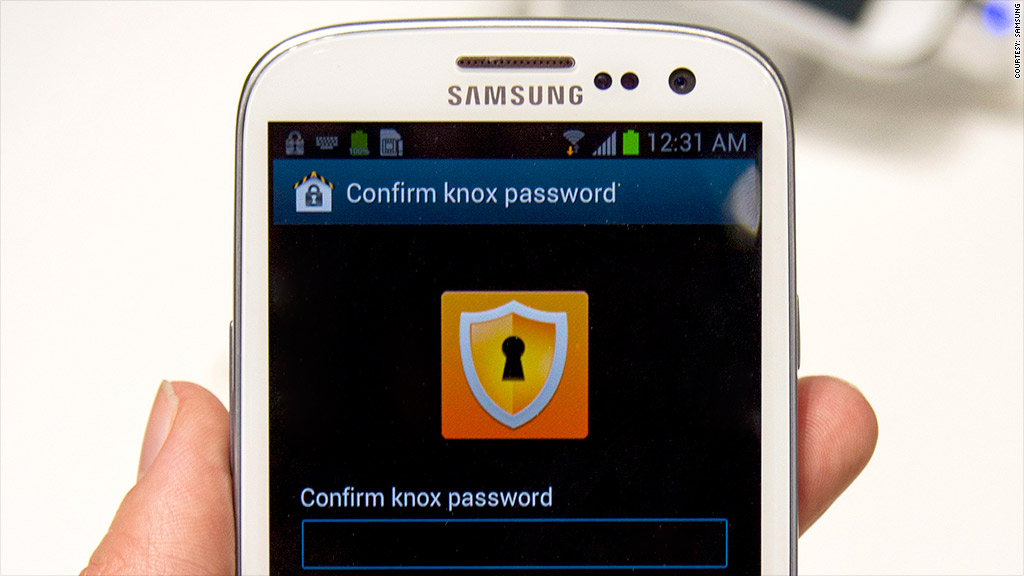
Having already stolen the consumer crown from Apple's iPhone, Samsung is looking to supplant BlackBerry in the business world.
To get corporate IT departments -- BlackBerry's (BBRY) last remaining stronghold -- to consider opening their gates to other mobile devices, Samsung will be padlocking its upcoming Galaxy S4 smartphone with a security solution appropriately dubbed "Knox" (like the famous fort with all the gold).
Galaxy S4 users will be able to maintain separate identities for work and play. Samsung says Knox places users' personal and work applications into separate and isolated containers, preventing malware from infiltrating the corporate network. The Galaxy S4 will be released Thursday.
Though a mix of hardware and software tricks developed by the U.S. National Security Agency, Samsung claims Knox prevents important data from getting into the wrong hands.
That's a very BlackBerry-esque promise and a first for Google's (GOOG) Android operating system. There are many software-based add-on security solutions for Android, but Samsung is the first to bake them right into the phone's hardware.

Samsung claims the Knox solution "addresses all major security gaps in Android." And some experts are giving Knox an early thumbs up.
"This is going to set the bar for Android devices, said Jeff Bardin, chief intelligence officer for consultancy Treadstone 71.
Nevertheless, the Android name still sends shivers down the spines of many security professionals. After all, it's the operating system for which 94% of mobile malware is written, according to security firm Kaspersky.
"My issue with Knox is it's still on the Android platform," said Mark Wuergler, senior security researcher at consultancy Immunity Inc. "They might not get in right away, but hackers are going to be lining up their armies right outside of Ft. Knox's walls."
Related story: Samsung stuffs a phone in new Galaxy Note 8.0 tablet
Other security experts are skeptical of Samsung's claims.
For instance, isolated systems are nothing new in the security world, and smartphone software is built with many of those protections already built in. Yet hackers still have proven able to break through the digital walls, fences and containers that security professionals have thrown at them.
"To claim that malware can't invade your device's apps and data is a stretch," said Rohit Sethi, head of product development for security firm SD Elements. "The threat landscape is changing all the time."
Samsung should know: The company encountered a nasty bug affecting many of its devices, including the Galaxy S3, late last year. The bug allowed attackers to access users' personal data and infect the devices with malware.
Whether Knox convinces BlackBerry-only organizations to consider an alternative remains to be seen.
Yet even if Knox isn't all it's cracked up to be, the company is likely barking up the right tree. Tired of BlackBerry's outdated technology, business professionals have begged their IT departments to let other smartphones work on corporate networks. Most companies have relented, allowing for a new "bring your own device" trend.
Apple (AAPL) has also made great strides in security. Its iPhone has gained a presence in 80% of Fortune 500 companies and Apple has been stealing BlackBerry contracts away from several government agencies.
BlackBerry has responded to the criticism though. Its long-awaited Z10 phone offers many of the fun features of an iPhone with the same security protocols that made IT departments fall in love with the company's devices in the first place.

